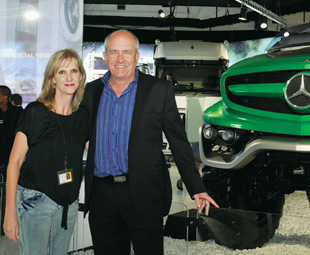Public transport, not public disgrace

It’s official: public transport can actually work. It can be safe, affordable, reliable and easy to use. (Trust me …)
Prost! I am penning Steering Column from Düsseldorf this month – I am here to attend the A+A exhibition (they don’t call me the editor in exile for nothing, you know …). Just in case you don’t know it, A+A is one of the largest health and safety exhibitions in the world. I am here in my capacity as editor of SHEQ MANAGEMENT, a sister publication of FOCUS.
But I digress. I am sharing this information with you because I want to chat about public transport that actually works. Like most big cities in Germany, Düsseldorf is a place that has really got it right. All the forms of public transport morph together beautifully, offering a safe and very viable alternative to the car. In fact, were I to ever live in a city such as Düsseldorf, I would not even consider owning one.
That’s because the public transport in this rather pretty city is really amazing. It’s accessible (there are two bus stops within two blocks of my apartment) and ever so convenient (a train arrives at the exhibition station every two minutes during peak hours).
It’s secure (I’m flying solo and, even late at night, I have felt perfectly at ease). It’s safe (the bus drivers especially seem to think that they’re all Sebastien Vettel wannabes … but they have not hit anything … yet). And
it’s clean.
Some of the drivers are even quite friendly (indeed a rare thing in Germany). I giggled en route to the show this morning. The driver said hello to a lady who climbed on the bus and she was quite confused. Clearly, she did not expect anything more than a glare.
Oh and did I mention that it’s reliable? It works like clockwork – most of the time. If it doesn’t, the implications are quite amusing. I walked from the train station to the bus stop yesterday (all of one block) and proceeded to relax in the bus shelter, out of the rain. Apparently the bus was running late. (I don’t bother to check the schedules, during peak hours they trundle along every 10 minutes or so … I’m not really interested in doing a countdown.)
But one little old lady felt differently. I could tell that the bus was late because she looked at her watch, glared down the road, uttered some choice phrases and then stomped off in the pouring rain. Ironically, the bus arrived 10 seconds later. One of the other commuters called out loudly to her, pleading for her to turn around. But she was so incensed that she didn’t even hear the call.
I could not resist waving gleefully at her as we cruised on by – my friendliness was rewarded by the single finger wave in
return … she was having a seriously bad day, poor old dear.
And the best thing about it? Public transport here in Düsseldorf is really affordable. When I arrived, I needed to make my way from the airport on various trains and buses. Then I planned to head into the centre of town for dinner. So I bought a daily ticket, entitling me to limitless travel. It cost the princely sum of €5,90 – around R81, depending on the woes of our ailing currency.
On day two, I hauled out another €5,90 to buy a second one. The guy behind the counter looked at me curiously. “Why do you want to buy a ticket?” he asked. I thought that his question was strange (the Germans are an exceptionally law-abiding nation) but explained that I didn’t want to risk getting fined. He looked at me as though I had just escaped from retard school, and explained gently that my ticket to the A+A, which was hanging around my neck, entitled me to free transportation in the greater Düsseldorf area. Not just during the duration of the show, but also for two days after its conclusion – just in case I wished to enjoy the city’s sights and sounds further.
It doesn’t get much more affordable than that …
Published by
Focus on Transport
focusmagsa




